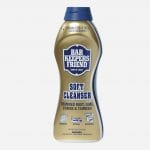Kitchen countertops take some of the most abuse of any area in your home. From hot pans to knives, spills, and more, your countertops are going to be met with a lot of abuse throughout their lifetime. Keeping a clean countertop will require a certain strategy that will vary depending on what material yours are made out of. To fill you in everything you need to know to prevent stains and care for your kitchen countertops, let’s take a look at how you should care for each type of material.
- Wood Kitchen Countertops
If you want to prevent stains on your wood kitchen countertops, you’ll need to apply some form of protection to them. This is usually going to be either mineral oil or tung oil. Let it sink into the counters for about 30 minutes before wiping away the excess with a cloth. Oil your wood counters once a year and wipe up spills quickly to prevent stains. - Concrete Countertops
Concrete is especially vulnerable to stains if not cared for properly. Apply a concrete stain repellent to your counters to prevent them from soaking up spills. A natural finish product that has fluro polymers will also help to lock out grease and oil stains before they can mar your counters. Such a product will also help in efflorescence prevention, a common problem for concrete counters - Quartz Countertops
One good thing about quartz, and a selling point in the quartz vs marble countertops debate, is that quartz countertops do not easily stain. They are non-porous and simply require you to act quickly when spills happen. You should also refrain from using them as a cutting board as well. - Solid Surface Countertops
As with most other types of materials, stain prevention mostly comes down to attentiveness and sealing for your solid surface texture countertops. This type of material needs to be properly sealed before anything. Afterwards, you’ll need to watch and make sure no spills are given the chance to sink into your counters. Also, take care to minimize scratching and chipping on your solid surface texture, as these can break the seal and allow liquids and other materials to more permanently stain your countertops.
Staining Prevention Comes Down to a Couple of Factors
Most countertop materials are able to resist stains somewhat well, provided you give them the tools to do so. Wood kitchen countertops need either tung or mineral oil to be applied yearly or even once every other year. Solid surface counters, concrete counters, and marble counters also need to be sealed before you can use them.
Other tips for all types of materials include not using them as cutting boards, and watching out for spills so you can clean them up almost as soon as they happen. If wine or other colored liquids are given the chance to sink into your counters for hours, they could bypass even a properly applied layer of sealant.
With a little preventative maintenance and a watchful eye, you should be able to keep your new kitchen countertops healthy and looking good for years to come, despite the abuse they’ll encounter over time.
Contractor Tip!!– Local countertop installers carry with them a bottle of BarKeepers friend soft cleanser. This helps them touch up any spots after install.
Mandy Lee is a contributor to Innovative Green Building Materials. She is a blogger and a content writer for the building materials industry. Mandy is focused on helping fellow homeowners, contractors, and architects discover materials and methods of construction that increase property value, maximize energy savings, and turn houses into homes.


